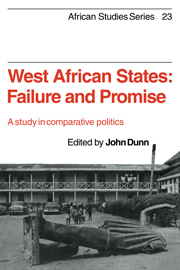1 - Comparing West African states
Published online by Cambridge University Press: 19 January 2010
Summary
Even at best comparative politics is a shaky trade, uneasy as to its intellectual ambitions and fickle in its criteria of analytical achievement. There are many reasons for this disarray, by no means all of them ills for which there is any obvious remedy even in principle. One of the main difficulties facing the student of comparative politics is the simple question of which units it is appropriate to select for comparison. Persons may be compared to summer's days and leaders of the British Tory Party to medieval implements of torture. Comparison can be as much a discerning of similarity as a savouring of contrast. It is certainly not difficult to find differences between historical experiences. But if one hopes to learn anything very clear or instructive from the activity of comparing, it is essential to select as units for comparison items which resemble each other in a great many ways. For the most part this problem of selection is resolved in professional practice in political science by the adoption of conventional institutional or ideological boundaries. Institutions which share a common descriptive label are compared systematically: political parties, public bureaucracies, educational systems, institutions of local government, armies, trade unions, multinational corporations. At the level of the state itself the units of comparison are often more overtly ideological (communist states or capitalist democracies), though the direct contrast between the favoured and the disfavoured naturally does not preclude being equally ideologically explicit. Such comparisons may serve well enough to evoke anxiety or to reassure. But they are better calculated to define the differences between sets of polities than to explain the characteristics of any particular polity.
- Type
- Chapter
- Information
- West African States: Failure and PromiseA Study in Comparative Politics, pp. 1 - 21Publisher: Cambridge University PressPrint publication year: 1978
- 1
- Cited by



